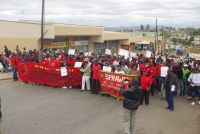Africa
South African splinters: From `elite transition' to `small-a alliances'

[The following article first appeared in AfricaFile's At Issue Ezine, vol. 12 (May-October 2010), edited by John S. Saul, which examines the development of the southern African liberation movement-led countries. It has been posted at Links International Journal of Socialist Renewal with permission.]
By Patrick Bond
South Africa's development goals won't be met

While South Africa's pollies and "BEE" elite party, there is lit
Third World health: Video -- Universal access by 20-when? Global leaders renege on promised aid
By the Treatment Action Campaign (South Africa)
September 28, 2010 -- The communities delegation on the Board of the Global Fund to Fight AIDS, Tuberculosis and Malaria and the Asia Pacific Network of People Living with HIV (APN+) released a video (watch above) on September 28, 2010, as part of the global day of action activities, highlighting the potential effectiveness and achievements of the Global Fund, and pointing out how miniscule the needed US$20 billion dollars is when compared to the amounts of money that has been spent on war and Wall Street banking bail outs.
Namibia: A trust betrayed – again?
[The following article first appeared in AfricaFile's At Issue Ezine, vol.
Swaziland: Crackdown on eve of protests, PUDEMO leader arrested

[See also "Swaziland: Small country, big struggle -- global day of action for democracy".]
By Lucky Lukhele and Norm Dixon
September 8, 2010 -- The deputy president of Swaziland's People's United Democratic Movement (PUDEMO) Sikhumbuzo Phakathi was arrested on September 6 at the Phongola border post as the Swazi police and army were deporting a delegation of South African activists from the Congress of South African Trade Unions (COSATU) and the Swaziland Democracy Campaign (SDC). PUDEMO president Mario Masuku was detained before the start a protest march on September 7 to mark the global day for democracy in Swaziland. He was "escorted home" by police to prevent his participation.

By David Masondo, Young Communist League chairperson
September 5, 2010 -- City Press -- There was cautious optimism among many leftists in the African National Congress (ANC) that the ousting of Thabo Mbeki in Polokwane [the ANC's 2007 national conference] might mark a shift towards a much more egalitarian economic policy, including "Black Economic Empowerment (BEE).
Instead, BEE is increasingly becoming too narrow, amounting to ZEE – that is, Zuma Economic Empowerment.
The recent multibillion-rand Arcelor-Mittal BEE deal involving Duduzane, President Jacob Zuma’s son, is another example of how BEE has become too narrow.
To crown it all, the president’s nephew, Khulubuse Zuma, seems to have suddenly become an African imperialist, amassing oil resources in the Democratic Republic of Congo.
South Africa: Strike ends, workers' anger remains

* * * STOP PRESS* * *
On September 6, the major trade unions representing South Africa's 1.3 million public servants and teachers announced that the 20-day strike for higher wages and allowances had been "suspended". See union statements below. Union leaders said the move would allow members to consider the latest government offer. Public servants went on strike demanding an 8.6% pay rise, while the government has offered 7.5%. According to the BBC, workers who came to hear union officials shouted in protest when they
announced that the strike was being suspended. Meanwhile, workers in many other industries are taking or threatening industrial action.
* * *
By Terry Bell, Cape Town
(Updated Sept. 8) Raj Patel: Food rebellion -- Mozambicans know which way the wind blows
Swaziland: Small country, big struggle -- global day of action for democracy

[The Swaziland Dem
South Africa: COSATU's Zwelinzima Vavi's Ruth First Memorial Lecture

